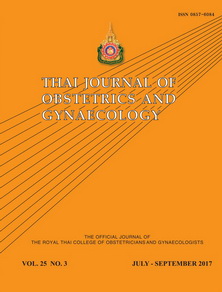Evaluation Iodine Status and Factors Associated with Low Urinary Iodine Level among Pregnant Women Who Received Iodine Supplementation during Pregnancy
Main Article Content
Abstract
Objectives: To assess iodine status and factors associated with low urinary iodine level in women who received iodine supplementation during pregnancy.
Materials and Methods: A prospective cross sectional study in term pregnant women admitted to labor room, Srinagarind Hospital, Khon Kaen University was implemented during May 2014 to December 2015. All 245 recruited women after completing the questionnaire for evaluating their knowledge, attitude and practice (KAP) of iodine consumption were asked to collect urine 5 - 10 ml. to assess urine iodine level. The information from their medical records was used to assess their obstetric history and medications during pregnancy. The good KAP was defined as six or higher from the full ten score. The urine iodine (UI) level <150 µg/L was categorized as low level. The microplate method was used to assess urine iodine levels by certified laboratory at Regional Health Promotion Center 7 Khon Kaen, Department of Health, Ministry of Public Health.
Results: Almost all of women received daily iodine supplementation tablets, only 6 received iodized oil. Their median UI level was 182 µg/L and 35.5% had low UI level. Their mean KAP score was 4.9 (SD=1.9). There were 39.6% women with good KAP. The daily tablet of iodine supplementation side-effect was the only significant factor associated with low UI levels.
Conclusion: Though the findings demonstrated the adequate median urine iodine level in pregnant women with the iodine supplementation, a substantial proportion of them still had low urine iodine level and need additional intervention.
Article Details
References
2. Zimmermann MB. Iodine deficiency. Endocr Rev 2009; 30:376-408.
3. Bath SC, Steer CD, Golding J, Emmett P, Rayman MP. Effect of inadequate iodine statusy in UK pregnant women on cognitive outcomes in their children: results from the Avon Longitudinal study of parents and children (ALSPAC). Lancet 2013;382:331-7.
4. Zimmermann MB. The impact of iodised salt or iodine supplements on iodine status during pregnancy, lactation and infancy. Public Health Nutr 2007;10:1584-95.
5. WHO Library Cataloguing-in-Publication Data. Assessment of iodine deficiency disorders and monitoring their elimination: a guide for programme managers. -3rd ed. World Health Organization, Geneva, Switzerland; 2007.
6. Surveillance for urinary iodine concentration of pregnant women in Thailand, Ministry of Public Health, by nutritional Bureau (Nutrition Division), Department of Health, Surveillance system for urinary iodine concentration (UIC) of pregnant women in Thailand. -3rd ed. World Health Organization, Geneva, Switzerland; 2007. (http://nutrition2.anamai.moph.go.th/ewt_news.php?nid=159)
7. International Council for the Control of Iodine Deficiency Disorders: Tracking progress towards sustainable elimination of iodine deficiency disorders in Thailand. Ottawa: International Council for the Control of Iodine Deficiency Disorders; 2009.
8. Policy Recommendations from the Development Cooperation Seminar “Iodine Deficiency Disorders: A Development Challenge for Thailand”, Thailand’s Ministry of Public Health and UN Country Team hosted a seminar on Thursday, 29 July 2010. (http://un.or.th/jointactivities/documents/policyIDD-eng.pdf)
9. Delange F. Administration of iodized oil during pregnancy: a summary of the published evidence. Bull World Health Organ 1996;74:101-8.
10. Tonmukayakul U, Velasco RP, Tantivess S, Teerawattananon Y. Lessons drawn from research utilization in the maternal iodine supplementation policy development in Thailand. BMC Public Health 2012;12:391.
11. Editorial: Iodized Salt System Initiative for Sustainability of the Elimination of IDD in Thailand. J Health Sci 2015;24:817-9.
12. Secretariat WHO, Andersson M, de Benoist B, Delange F, Zupan J. Prevention and control of iodine deficiency in pregnant and lactating women and in children less than 2-years-old: conclusions and recommendations of the Technical Consultation. Public Health Nutr 2007;10:1606-11.
13. Sukkhojaiwaratkul D, Mahachoklertwattana P, Poomthavorn P, Panburana P, Chailurkit LO, Khlairit P, et al. Effects of maternal iodine supplementation during pregnancy and lactation on iodine status and neonatal thyroid-stimulating hormone. J Perinatol 2014;34:594-8.
14. Rajatanavin R. Iodine deficiency in pregnant women and neonates in Thailand. Public Health Nutr 2007;10:1602-5.
15. Singsena S, Mugtabhant B. Factors affecting urinary iodine concentration of pregnant women attending antenatal care clinic. Mahasarakarm Hospital J 2015;12:161-72.
16. Study on Knowledge, Attitude and Practice on iodine deficiency disorders among Albanian women of reproductive age. Project report: United Nations Children’s Fund (UNICEF); 2007. (http://citeseerx.ist.psu.edu/viewdoc/download?doi=10.1.1.442.3395&rep=rep1&type=pdf)
17. Taylor PN, Okosieme OE, Dayan CM, Lazarus JH. Therapy of endocrine disease: impact of iodine supplementation in mild to moderate iodine deficiency: systematic review and meta-analysis. Eur J Endocrinol 2013;170:R1-R15.
18. Taylor PN, Okosieme OE, Dayan CM, Lazarus JH. Therapy of endocrine disease: impact of iodine supplementation in mild to moderate iodine deficiency: systematic review and meta-analysis. Eur J Endocrinol 2013;170:R1-R15.
19. Taylor PN, Okosieme OE, Dayan CM, Lazarus JH. Therapy of endocrine disease: impact of iodine supplementation in mild to moderate iodine deficiency: systematic review and meta-analysis. Eur J Endocrinol 2013;170:R1-R15.


